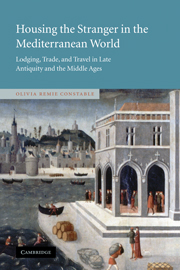 Housing the Stranger in the Mediterranean World
Housing the Stranger in the Mediterranean World Book contents
- Frontmatter
- Contents
- List of illustrations
- List of maps
- Acknowledgments
- Introduction: A culture of travel: words, institutions, and connections
- 1 “Accepting all comers”: a cross-cultural institution in late antiquity
- 2 The transition from Byzantium to the Dār al-Islām
- 3 Commerce, charity, community, and the funduq
- 4 Colonies before colonialism: western Christian trade and the evolution of the fondaco
- 5 Conquest and commercial space: the case of Iberia
- 6 Fondacos in Sicily, south Italy, and the Crusader states
- 7 Changing patterns of Muslim commercial space in the later middle ages
- 8 Christian commerce and the solidification of the fondaco system
- 9 The fondaco in Mediterranean Europe
- Conclusion A changing world: new peoples and institutions in the early modern Mediterranean
- Selected bibliography
- Index
5 - Conquest and commercial space: the case of Iberia
Published online by Cambridge University Press: 27 August 2009
- Frontmatter
- Contents
- List of illustrations
- List of maps
- Acknowledgments
- Introduction: A culture of travel: words, institutions, and connections
- 1 “Accepting all comers”: a cross-cultural institution in late antiquity
- 2 The transition from Byzantium to the Dār al-Islām
- 3 Commerce, charity, community, and the funduq
- 4 Colonies before colonialism: western Christian trade and the evolution of the fondaco
- 5 Conquest and commercial space: the case of Iberia
- 6 Fondacos in Sicily, south Italy, and the Crusader states
- 7 Changing patterns of Muslim commercial space in the later middle ages
- 8 Christian commerce and the solidification of the fondaco system
- 9 The fondaco in Mediterranean Europe
- Conclusion A changing world: new peoples and institutions in the early modern Mediterranean
- Selected bibliography
- Index
Summary
THE IMPACT OF CONQUEST ON COMMERCIAL SPACE
Christian military and political expansion into Muslim-held territories in the central middle ages, like the growth of European overseas trade, had critical consequences for the evolution of commercial space in conquered regions. As Muslim cities in the Iberian Peninsula, Sicily, and the Near East came into Christian hands in the wake of crusade and reconquest in the eleventh, twelfth, and thirteenth centuries, Islamic urban institutions – including the funduq – were adopted and adapted to fit the needs of their new Christian context. Because many of these facilities were highly lucrative, whether for trade, taxation, or rental, incoming Christian rulers kept a close watch over their preservation and management. In the wake of Christian conquest, merchants also took immediate steps to maintain the fondaco system, although their use of these facilities would gradually decline under Christian rule. In Sicily and Spain, conquest initiated a permanent political and religious change, so that by the 1280s and 1290s the fondaco and its cognates had taken on a distinctly new Christian form. In the Near East, in contrast, crusader territories would revert to Muslim rule by the end of the thirteenth century.
There are striking similarities in the ways that the funduq was converted for Christian use under new regimes in Iberia, Sicily, and the Crusader states at roughly the same period. One obvious link is the presence of Italian traders, who were active in each of these regions, both before and after Christian conquests.
- Type
- Chapter
- Information
- Housing the Stranger in the Mediterranean WorldLodging, Trade, and Travel in Late Antiquity and the Middle Ages, pp. 158 - 200Publisher: Cambridge University PressPrint publication year: 2004
